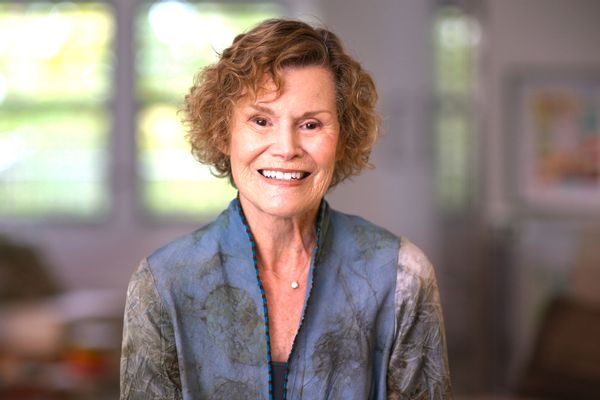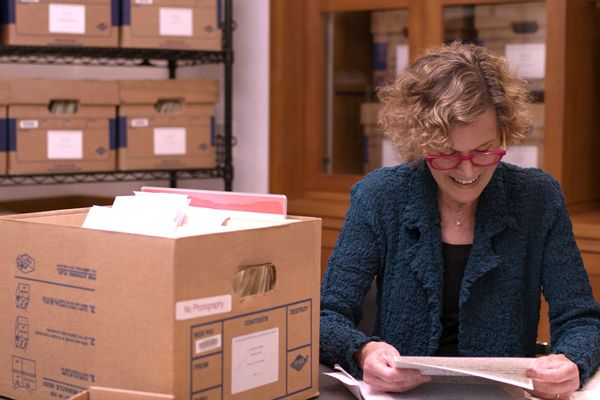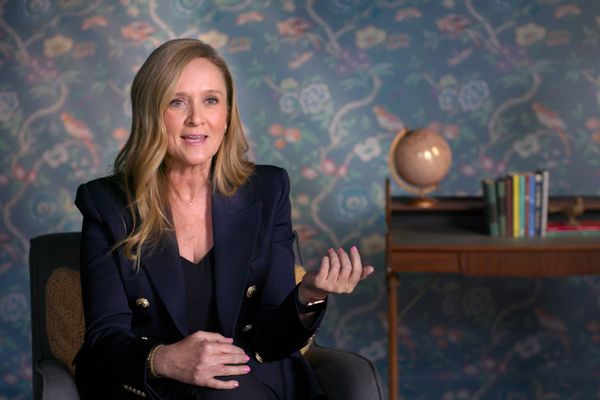
Some of Judy Blume's books are nearly 50 years old, and they're suddenly everywhere, as is the writer. The documentary about her life and work "Judy Blume Forever," premiered at Sundance and is now streaming on Prime Video. At the same time, the feature film adaptation of her novel "Are You There God? It's Me, Margaret" – starring Abby Ryder Fortson, Rachel McAdams and Kathy Bates – is arriving in theaters.
So too the climate of moral panic that dogged Blume's work in the 1970s and '80s has returned. The banning, censorship and criticism of children's books has reached a fever pitch. Books have been stripped from the shelves. Libraries and writers alike have been threatened with persecution. According to TIME, which quoted a new report from PEN America, "book bans in the U.S. have reached their highest levels yet."
That's familiar territory for Blume, writer of more than 25 published novels and winner of a slew of awards, including the E.B. White Award from the American Academy of Arts and Letters and the Distinguished Contribution to American Letters Medal from the National Book Foundation. Blume has also been called "a Pied Piper leading kids down the wrong path," as the Christian Science Monitor wrote in 1981, in a piece which also cited unnamed critics labeling her work as "'pandering,' 'salacious,' and 'trashy.'" Why? Because Blume dared to write about menstruation, sex, death, masturbation, birth control, disability and emotions in books for children and teens.
Judy Blume is back, baby. She never went away, but as the "Judy Blume Forever" documentary proves, her writing is still both controversial and beloved, and kids and adults alike need such candor and openness in stories more than ever. Salon spoke with Davina Pardo and Leah Wolchok, co-directors of "Judy Blume Forever," which, along with vintage footage, features interviews with Blume herself, children from the '70s and '80s and children now, and celebrities from Molly Ringwald to Samantha Bee.
This conversation has been lightly edited for length and clarity.
How did you first encounter Judy Blume's books? Did you read them as children? Did you love them when you were little?
Davina Pardo: We will give you two very different answers. I did. I was a shy bookworm who loved reading Judy Blume books. I think they were among the ones that I went back to again and again until the paperbacks were sort of threadbare. I had a little spot at my house that I sat in. There was a chair next to a wall, and I was supposed to sit on the chair. But I sat in the space between the chair and the wall. It was just such a cozy place to be alone with a book. And I remember being there and reading Judy Blume books. I think there's a sense that she was always there. I don't know what the first book was, but her books were sort of always there with me and the most formative was probably "Are You There God? It's Me, Margaret." Because I was an early bloomer and got my period when I was 10, before my older sister got hers. And that book, going inside the head of a kid who wanted this thing that I was so ashamed of, was so incredibly comforting for me.
"I wish I could go tell my 11-year-old self not to listen to all the people who said, 'That book is not OK for you. It's a dirty book. It's a naughty book. Don't read it.'"
Leah Wolchok: I was a late bloomer in every sense of the word. I did not get my period until I was 16, which was embarrassing in a whole different way. Because I was just waiting and waiting, like, what is wrong with my body that I am not getting my period? But also, I grew up in Jacksonville, Florida in the '80s when Judy's books were seen as taboo and where they were banned. I think I internalized a lot of the shame surrounding periods and puberty and girls' bodies. Women's bodily autonomy was something to be feared. And I listened to those messages. I wish I hadn't, but I did. I was a good girl who just did what I was told.
I will tell you that we were passing around V.C. Andrews books, I devoured "Flowers in the Attic," and that whole series. How was that OK, but reading a book about a girl who is wondering about her body and questioning religion and having certain feelings about her friends — why wasn't that OK? I wish I could go tell my 11-year-old self not to listen to all the people who said, "That book is not OK for you. It's a dirty book. It's a naughty book. Don't read it." Because I think it would have really helped me as a flat-chested, shy, insecure 11-year-old to meet Margaret.

That's a good point. Because at that age, I was devouring Christopher Pike books, which were these murderous teen stories, and somehow that was OK, you're right. But Judy Blume? Too much.
Wolchok: Empowerment was so frightening.
That's the scariest thing of all for young kids, especially for girls to be doing, right? So that kind of leads into my next question, which is, why is now the time for a documentary on Judy Blume?
"You wish it weren't quite so timely, because what's going on in the United States right now is so upsetting, so disturbing."
Pardo: When we started the film, we knew her work was still relevant. We knew it still resonated with kids. We started this film when Trump was president; we knew that bodily autonomy wasn't something we could take for granted. And we knew that books were still being banned. But we had no idea how timely it would be. We had no idea how book banning would just explode in the way it has the last couple of years. It's one of those things where you wish it weren't quite so timely, because what's going on in the United States right now is so upsetting, so disturbing. Judy herself is furious and has been speaking out a lot about it. But we hope that the film can help inspire people to kind of push back against what's happening, even if it's not happening in their community. It's so important to get involved and push back because it's happening in a much more political way than it ever has. It's being legislated in very frightening ways across all levels of government.

"They thought no one else in their life could understand them, but Judy Blume could."
I was really surprised in the documentary to learn that Judy Blume is in her 80s — talking about her speaking up still, the fact that she still uses her voice in that way. I guess in my head she always seems timeless and very young — like how kids in the documentary think that she's a kid too, like them. Why did you decide to include many of the letters that kids had written to her over the years? And some of the letter writers? And how did you decide which letter writers to feature?
Wolchok: I think we knew from the beginning that the letters will be a big part of the film. For a while, we used to think that the title of the film was going to be "Dear Judy" or "Dear Judy Blume" because the letters are such an important part of her story. They show that deep connection that she's had to her readers and with her readers, not just through her words and her stories, but through her words and her personal letters that she wrote when she was responding to kids. In the '80s, she was receiving 1,000 letters a month from kids who were pouring their hearts out to her about how they were feeling about their bodies, their friends, their parents. They were writing to her about eating disorders, depression, sexual abuse, suicidal thoughts, and she was really seen as their fairy godmother, their guardian angel in a way that they thought no one else in their life could understand them, but Judy Blume could.
"She has this incredible memory for childhood."
So we knew the letters, the words of the kids, and we really wanted the handwriting of some of those kids to be able to be included in the film. We asked Judy in one of our first meetings with her, if she would be willing to introduce us to any of the women who wrote to her when they were kids and who she still kept up with. All of the letters are now housed at the Beinecke Library at Yale. But they're under very strict protections to protect the privacy of all the people who wrote to her so if you ever research her letters of the library, you're not allowed to reach out to any of the letter writers. You have to ask Judy Blume for permission, and have her make the introduction. So she did, she introduced us to Laurie Kim and Karen Chilstrom, who were so open. And we feel really grateful for their openness and their honesty and sharing their stories in the film.

Pardo: She has this incredible memory for childhood. We went to see her childhood home in New Jersey. And I remember her looking out the window of her childhood bedroom and going down the block and saying the first and last name of every single person in every single house. But not only does she remember those details, she remembers the feelings of being young and she remembers what it feels like to be misunderstood by an adult or to have a conflict with a friend or to feel like your body is doing all kinds of things that you don't understand. She poured that, that empathy and that memory for childhood, into her books in a way that I think resonated so deeply with kids. She also created characters who screwed up, and that's so important: for children to see you don't have to be perfect. You're not. You can think mean thoughts and wish your siblings didn't exist, all that stuff. It stays with you. I think we're not used to hearing that from adults.
I loved how you interview some kids of today. And they also love her books and read her work as well. Were you surprised that kids right now still read these 40-year-old books?
"There are things that are dated, but the feelings that kids have about their bodies, their families, their friends —those feelings don't change."
Wolchok: Well, we each have our own kids who we sort of fed the entire Judy Blume canon to so we knew. We watched our own kids experiencing Judy Blume now and seeing how resonant her words still are and how resonant her stories still are. We were really grateful that our co-producer, Emily's mom is an English teacher at a middle school in Long Island and she's the one who started this Judy Blume curriculum in her sixth grade classroom. We were able to go in and meet some of her students who had read some of the books that she had introduced to them as their teacher.
I love that we include these contemporary middle schoolers. There's that funny moment in the film where the girl is like, What do you call that [rotary] phone? Some of the technology in the book seems obsolete, obviously. The fact that gender representation in Judy's books is pretty binary, down-the-line binary as our sex educator Rachel Lotus says in the film. And as Gabrielle Moss says in the film, none of the moms [in the books] work. There are things that are dated, but the feelings that kids have about their bodies, their families, their friends — those feelings don't change. And I think it was so great to be able to talk to kids who feel connected to Judy's characters still 50 years later.
"Judy Blume Forever" is now streaming on Prime Video. Watch a trailer via YouTube below:







